Suchergebnisse für "Factsheet: Energietechnologien gestalten, die für alle sinnvoll und nutzbar sind"
Thermisch-hygrisches Verhalten von Glasdoppelfassaden unter solarer Einwirkung - Theorieevaluierung durch Vorortmessung

Präzisierung der Ausgangsparameter von thermodynamischen Simulationsberechnungen durch Vorortmessungen an der fünfgeschoßigen Doppelfassade des Bundessozialpädagogischen Instituts Baden bei Wien
OPEN HEAT GRID - Offene Wärmenetze in urbanen Hybridsystemen
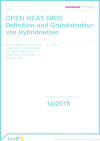
Primäres Forschungsthema von OPEN HEAT GRID war die Untersuchung der Möglichkeiten zur Forcierung der Einspeisung industrieller Abwärme in bestehende Fernwärmenetze.
Schriftenreihe
1/2018
Herausgeber: BMVIT
Deutsch
Downloads zur Publikation
REVITALISIERUNG mit S.A.M. - Synergie aktivierende Module

Fallspezifisch entwickelte Synergie aktivierende Module zur Revitalisierung bestehender Baustrukturen ohne Nutzungsunterbrechung (zwei Projekte, eine Ausführung).
Low Tech – High Effect! Eine Übersicht über nachhaltige Low Tech Gebäude
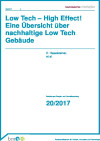
In dieser Studie wurden Ansätze von Low Tech Gebäuden näher betrachtet und besonders innovativ und repräsentativ erscheinende Konzepte detailliert dokumentiert. Ziel war es, den derzeitigen Stand der Technik und das vorhandene Know-how und Wissen anhand realisierter Beispiele aufzuarbeiten sowie Potenziale zur Weiterentwicklung aufzuzeigen.
Schriftenreihe
20/2017
Edeltraud Haselsteiner, Andrea Bodvay, Susanne Gosztonyi, Anita Preisler, Michael Berger, Bernhard Gasser
Herausgeber: BMVIT
Deutsch, 192 Seiten
Downloads zur Publikation
Optimierung der SOLARenergienutzung in URbanen Energiesystemen (URSOLAR)
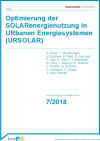
URSOLAR stellt EntscheidungsträgerInnen eine Roadmap zur integrierten urbanen Solarenergie-nutzung zur Verfügung. Es wird aufgezeigt, wie Photovoltaik (PV) und Solarthermie angepasst an infrastrukturelle und rechtliche Gegebenheiten in idealtypischen Stadtquartieren aus ökonomischer, ökologischer und sozialer Sicht sowie unter Berücksichtig von Stakeholder-Interessen optimal ge-nutzt werden können.
Schriftenreihe
7/2018
A. Posch, T. Brudermann, M. Buchner, E. Fleiß, D. Geringer, P. Hart, S. Hatzl, T. Kallsperger, G. Lang, T. Mayrold, E. Meißner, C. Reischl, G. Schnedl, S. Seebauer, K. Stöger, A. Würz-Stalder
Herausgeber: BMVIT
Deutsch, 137 Seiten
Downloads zur Publikation
Machbarkeitsanalyse zertifizierte Plus-Energie-Quartier-Sanierung des denkmalgeschützten Otto-Wagner-Areals (OttoWagner-ArealPlus)
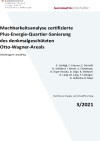
Entwicklung eines innovativen denkmalschutzverträglichen Sanierungskonzepts zur Transformation des Wiener Otto Wagner-Areals in ein Plus-Energie-Quartier. Das Jugendstil-Juwel umfasst eine Fläche von rund 50 Hektar, 70 Gebäude und eine Brutto-Grundfläche von rund 200.000 m². Der Lösungsansatz umfasst dabei höchste Energieeffizienz- und Komfortanforderungen.
Schriftenreihe
3/2021
K. Schlögl, C. Kresser, E. Schriefl, H. Schöberl, I. Artner, S. Chatterjee, D. Ürge-Vorsatz, D. Ürge, K. Stieldorf, F. Gharakhanzadeh, I. Stieldorf, G. Lang, M. Lang, T. Lebinger, G. Jedliczka, B. Mayr
Herausgeber: BMK
Deutsch, 162 Seiten
Downloads zur Publikation
Langzeitevaluierung des Energieverbrauchs von 100 energieeffizienten Gebäuden in Österreich als repräsentativer Querschnitt österreichischer Leuchtturmobjekte (LZE 100 Leuchtturmobjekte)
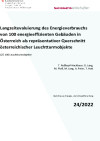
Erfassung, Auswertung und Analyse von Energieverbrauchsdaten von 100 energieeffizienten Gebäuden in Österreich über eine Betriebszeit von 3 bis 25 Jahren als repräsentativer Querschnitt der österreichischen Leuchtturmobjekte. Differenzierung nach Gebäudetypen, Energieträger und Ermittlung der realen Treibhausgas-Emissionen. Vergleich der gemessenen Verbräuche zu Benchmark-Werten.
Schriftenreihe
24/2022
T. Roßkopf-Nachbaur, G. Lang, M. Ploß, M. Lang, A. Peter, T. Hatt
Herausgeber: BMK
Deutsch, 143 Seiten
Downloads zur Publikation
Inter-linked design as a strategy towards sustainable buildings - removing deficiencies of learning and of diffusion

The aim is to investigate the role of inter-linked design team organisation in the design of sustainable buildings and to formulate ready-to-use recommendations and guidelines for dissemination.
Innovative Refurbishment of Single Family Houses

Evaluation of best-practice models and recommendations to support dissemination
Hygrothermal behaviour of double-skin facades in solar irradiation - theory evaluation by means of on-location measurements

Detailed clarification of the base parameters of thermodynamic simulation calculations by means of on-location measurements on the five-storey double-skin facade of the Federal Institute of Social Education in Baden bei Wien
Technical status of ventilation systems for buildings

Evaluation of existing ventilation systems in Austria considering technical quality and practicability.
Benchmarking - sustainability of housing subsidies across the federal provinces

Systematical description, analysis and comparison of all ecological, economic and social sus-tainability of the systems aspects of housing subsidy for new buildings and the renovation of buildings across the federal provinces of Austria; an analysis of regional-economic effects and a statistical-econometric analysis of the allocation effects of housing subsidies.
Solar Assisted Heating Networks

An investigation of the economic and ecological usefulness of coupling two CO2 neutral energy sources; solar installations for multi-family houses, producing standardised systems concepts and planning guidelines.
Industrially produced residential dwellings

Potential of future development for industrially produced residential dwellings Enquiry on international tendencies in automated manufacturing and assessment of viable strategies for their implementation into the Austrian building sector
Experiences and attitudes of users as a basis for the development of sustainable housing concepts with high social acceptance

The aim of this project was to a) analyse current experiences of users of ecologically innovative residential buildings ("passive houses", solar houses, etc.) in Austria, b) to evaluate innovative housing concepts in focus groups, and c) to create a model for the continuous participation of users in the innovation process.
What is so beautiful about the own home - a life-style concept of housing

Motives behind the wish of living in a certain way - here, especially in a detached house - explained through a life-style concept
Total Quality Design and Assessment of buildings as a strategy to increase the level of know-how with regard to the issue of "sustainable buildings".

Total Quality Design and Assessment is an instrument to increase the demand for high quality buildings; "high quality" in terms of improved comfort as well as decrease in negative environmental impact, at affordable costs. Application of TQ design targets requires additional and new knowledge, thus increasing the level of know-how with regard to the issue of "sustainable buildings".
The Passive House in Practice

Strategies to open markets for passive houses in the east of Austria
Evaluation of the planning and building processes of multi-storey wooden construction residential and office buildings, and the development of measures to optimise these processes.

An analysis of the building and planning processes of multi-storey wooden construction residential and office buildings, taking into consideration the opinions of the professionals involved (planners, building contractors, building executives), then the development, documentation and distribution of ways to optimise these processes, using "Info-Tool" software.
Factors which hinder and support the market introduction of innovative residential building concepts - an information offensive for planners and technology producers.

In order to actively increase the diffusion of innovative residential buildings, the results of currently available research were summarised to produce a "'diffusion campaign", directed at building planners, residential building contractors and selected technology producers.
